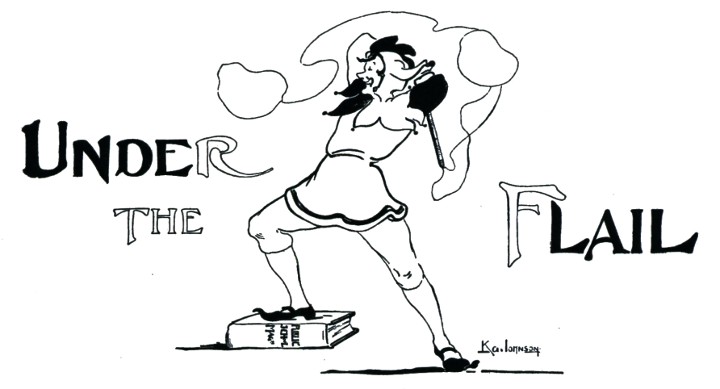Public School Magazine, April 1901

“It was with mixed feelings,” said the Colonial Secretary to me the other day, “that I read the report of the Old Hymerians’ debate on the subject of myself. Hang it all, Point, one of them said my patriotism was of Brummagem make, and like unto tinkling brass. Nice thing to say of a fellow behind his back!” “Oh, I don’t know, you know,” I replied, somewhat vaguely. “Meant as a compliment, I expect. Biblical allusion, you know, and that sort of thing. Besides, another member said you were very like Pitt.” He brightened up at once. “Like Pitt?” he said, “Ah! well, I suppose I am rather like Pitt. Sensible young fellow that. Make his way in the world. Well, rather. Like Pitt, by Jove! Must tell that to Salisbury. So long,” and he walked away, beaming.
From what I can gather, Tonbridge appears to be making matters warm for the two societies that flourish there, the Navy League and the Games Committee, which is, if we may trust to common report, also a Knave-y League. On the subject of the Navy I cannot speak without prejudice. In the heart of this great metropolis it is impossible to walk abroad without meeting one or more desperadoes singing (or whistling, which is worse), “It’s ther Nivy, ther Berritish Nivy, thet keeps our fows at biy.” This sort of thing has but one result. We rush home, tear our coloured “Heroes of the British Navy” from the walls, and send off a thumping subscription to the “Daily News.” As for the Games Committee, I have my eye on them. I have spoken.
A lecture was delivered at Sedbergh recently on “Cruelty to Animals” by a gentleman who, says my informant naively, has probably killed as many animals as most Englishmen—and so, we are left to infer, ought to be an authority on the subject. After exhibiting several lethal weapons of the trap class, he concluded his lecture by exhorting his audience to take the part of the lower animals, presumably with a view to conducting a species of dress-rehearsal with the aforesaid traps, in which he would sustain the rôle of the sportsman. There was little inclination to deal.
“The object of pantomime,” says Aristotle in one of his undiscovered MSS., “is to excite thirst and patriotism. Boil gently for thirty-four minutes.” This last sentence is believed by most scholars to have crept into the text, as its connexion with the context presents certain difficulties which need not be touched upon here. What I am trying to break to my gentle reader is the fact that Manchester Grammar School disapprove of pantomimes, England’s noblest product. Oh, infamiam! I hear you shriek, oh, impudicitiam! Exactly. Shocking thing, isn’t it? Only don’t tell anyone I told you. They are trying to hush it up.
If I have any spare time from my arduous surveillance of the Tonbridge Games Committee and the Premier’s foreign policy, I shall certainly employ it in sending an optic for a week-end to Windsor to keep watch on the X. In the first number of this periodical the Editor announces that all the profits of the paper will go to the giving of a cup, to be called the “X cup.” In the next number he says: “Well, nearly all.” I eagerly await the time when among the “Answers to Correspondents” will be found the following: “Inquisitive: To what cup do you refer?—Ed. X.”
Life at Malvern is pleasant but precarious at the present moment. Inside the building a paving-stone of shamefully loose habits threatens the pedestrian, while over the entrance of the chapel hangs a large slate, like the sword of Damocles, which keeps not only itself but the passers underneath in a state of great suspense.
A correspondent, who signs himself “Crichton,” writes informing me that he likes the Easter term because there is no prize-giving. “Why,” says he, “anyone presumably sane wants a book like ‘Marius the Epicurean’ bound in purple with the school arms in amber, when you can get ‘Captain Kettle’ at any bookshop for four-pence-halfpenny, is more than I can make out.” “Ah!” I murmured to myself, dropping into the French tongue, as is my habit in moments of emotion: “Mais oui. Vous avez raison ca, mon vieux.” As one who never annexed a single prize throughout life I can speak without bias.
Now that the Exams. are with us, the problem arises as to how they are to be dealt with. Under ordinary circumstances one would make a bee-line for the Sanatorium and stay there till the danger was past. In the Easter term, however, there is the risk of missing the Sports, which would never do. Coughs, colds, and rheumatism being out of the question, there only remains, as far as I can see the homely sprained wrist, unless of course you are thinking of shaping for the Weight. In that case it is better to bear with the ills you are likely to have in the form-room, keeping in mind the proverb, Bis dat qui cito dat, and give your papers up as quickly as possible.
Jack Point.
Editor’s notes:
Joseph Chamberlain was Secretary of State for the Colonies at the time; in March 1906 Wodehouse’s lyric “Mister Chamberlain” (music by Jerome Kern) would be a hit interpolation into the musical comedy The Beauty of Bath.
Brummagem: flashy cheap or tawdry goods, from the showy brass ware made in Birmingham
Biblical allusion: a slight misquote of I Corinthians 13:1
Oh, infamiam! oh, impudicitiam!: Oh, infamy! oh, shamelessness!
Bis dat qui cito dat: he gives twice who gives promptly
 Madame Eulalie’s Rare Plums
Madame Eulalie’s Rare Plums